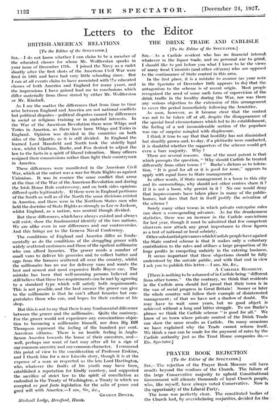Letters to the Editor
BRITISH-AMERICAN RELATIONS . [To the Editor of the SPECTATOR.] SIR,—I do not know whether I can claim to be a member of the educated classes for whom Mr. Wolfferstan speaks in your issue of December 17th. I joined the Navy as a cadet shortly after the first shots of the American Civil War were fired in 1861 and have had very little schooling since. But I can at all events claim to have associated with the educated classes of both America and England for many years, and the impressions I have gained lead me to conclusions which differ materially from those stated by either Mr. Wolfferstan or Mr. Kimball.
As I see the matter the differences that from time to time arise between England and America are not national conflicts but political disputes—political disputes caused by differences in social or religious training or in material interests. In the War of the American Revolution there were Whigs and Tories in America, as there have been Whigs and Tories in England. Opinion was divided in the countries on both sides of the Atlantic, as it is still divided. In England the learned Lord Mansfield and North took the strictly legal view, whilst Chatham, Burke, and Fox desired to adjust the law to the facts in a spirit of liberal toleration. Many officers resigned their commissions rather than fight their countrymen in America.
These differences were manifested in the American Civil War, which at the outset was a war for State Rights as against Unionism. It was in essence the same conflict that arose at the time of the War of the American Revolution and during the Irish Home Rule controversy, and on both sides opinions differed quite legitimately. If there were in England partisans of the South as well as of the North the same divisions existed in America, and there were in the Northern States men who held the doctrine of State Rights as strongly as Lee or Jackson, whilst England, as a nation, was neutral though divided.
But these differences, which have always existed and always will exist, show the fundamental identity of the two nations. We are alike even in our differences and our controversies. And this .brings me to the Geneva Naval Conference.
The conditions of England and America differ as funda- mentally as do the conditions of the struggling grocer with widely scattered customers and those of the opulent millionaire who can afford luxuries. The grocer needs a number of small vans to deliVer his groceries and to collect butter and eggs from the farmers scattered all over the country, whilst the millionaire has no use for delivery vans and wants the best and newest and most expensive ROM Royce car. The mistake has been that well-meaning persons believed and still believe that these two requirements can be met by agreeing to a standard type .which will satisfy both requirements. This is not possible, and the best answer the grocer can give to the millionaire is that he can't afford luxuries. but con- gratulates those who can, and hopes for their custom at his shop.
But this is not to say that there is any fundamental difference between the grocer and the millionaire. Quite the contrary. For the grocer would not experience any conscientious objec- tion to becoming a millionaire himself, nor does Big Bill Thompson represent the feeling of the hundred per cent. American citizens. There is no hostile feeling in Anglo- Saxon America towards the home of their ancestors, and— well, perhaps our want of tact may after all be a sign of our common ancestry and our common character. I commend this point of view to the consideration of Professor Erskine, and I thank him for a new Lincoln story, though it is at the expense of a man so respected as the late Lord Hartington, who, whatever the faults of his youth may have been; established a reputation for kindly courtesy, and supported the sacrifice of strict law to the spirit of conciliation as embodied in the Treaty of Washington, a Treaty in which we accepted ex post facto legislation for the sake of peace and good will with America.—! am, Sir, 4;(•,,






























 Previous page
Previous page